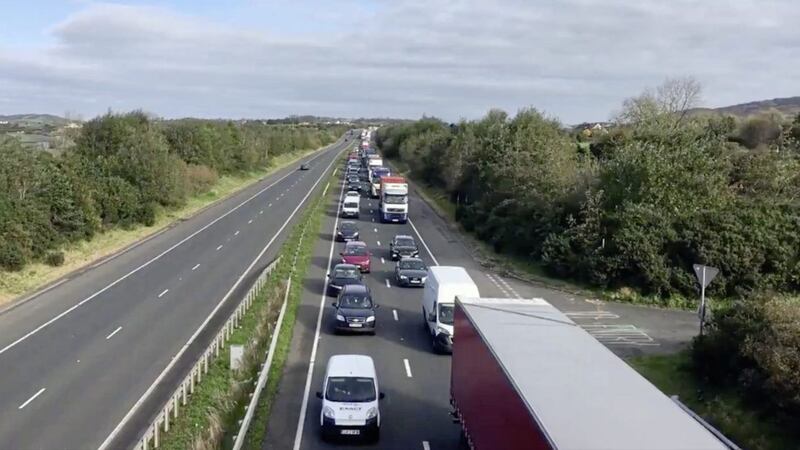DRIVERS faced long tailbacks on the main Belfast to Dublin road as gardaí started a major policing operation to coincide with the introduction of highest level of Covid-19 restrictions in the Republic.
Traffic was diverted onto the Carrickdale roundabout where offices were stopping motorists and checking the nature of their journey.
Officers had closed the road at the Junction 20 N1 exit on the southern side of the border to talk to each driver and depending on their response either turned vehicles back or allowed them proceed and re-join the N1 again on the onslip.
According to motorists making the journey, the queues stretched back a few miles, with one woman reporting it took her two hours and 50 minutes to get from her home in Newry to work in Dundalk.
Under the Dublin government's five-tiered framework for living with the virus, the Republic moved to Level 5 restrictions at midnight on Wednesday for six weeks.
Gardaí confirmed the public will see high visibility patrols and rolling checkpoints on main roads, with more than 2,500 gardaí on duty at any one time to ensure compliance with the public health guidelines.
In addition to 132 static motorway checkpoints introduced earlier this month, there are now hundreds of rolling checkpoints on main and secondary roads.
There will also be patrols in parks, natural beauty spots, and public amenities.
Training in the Garda College has been suspended for nine weeks - except for specialist training - allowing 200 trainees and 60 gardai working as tutors/instructors to be transferred to front-line policing, along with many in administrative roles.
Its 12-hour contingency roster is extended until the end of March 2021.
Commissioner Drew Harris said it is "vital" that there is again a high level of compliance from the public as "this will help save lives".
He insisted Garda is continuing with its graduated response of policing by consent.
The service has pledged to continue to assist vulnerable people, in particular those who are isolated and victims of domestic abuse.
Deputy Commissioner John Twomey said: "Gardaí have collected prescriptions, delivered pensions and had socially distanced contacts.
"If people need such assistance or know someone who does, please contact your local Garda station. We are here to help."
Women's Aid said it expects the restrictions to result in a surge in contacts about domestic violence over the coming weeks.
During the last period of heavy restrictions it responded to a 43 per cent increase in calls from women trapped in their own homes with abusers.








